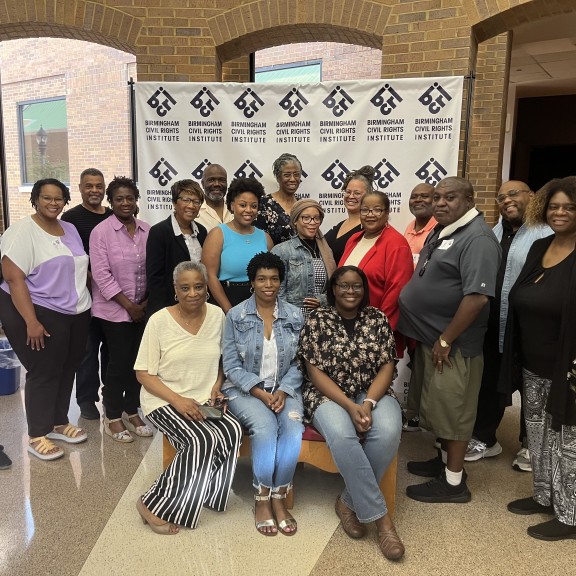Connecting a Network of Learning
SJN is increasingly focused on fostering critical connections among key stakeholders — from newsrooms and professional journalists to J-school educators and students — so they can engage directly with one another in new and dynamic ways as they advance the practice of solutions journalism.
Solutions journalism sells — do it until it becomes what you are known for, innovate and keep innovating around it. Before long, it will fetch you a loyal and happy audience, including revenue opportunities.
Pictured above: HBCU Educator/Black Press Academy participants pose for a photo in Birmingham, Alabama.
Collaboratives
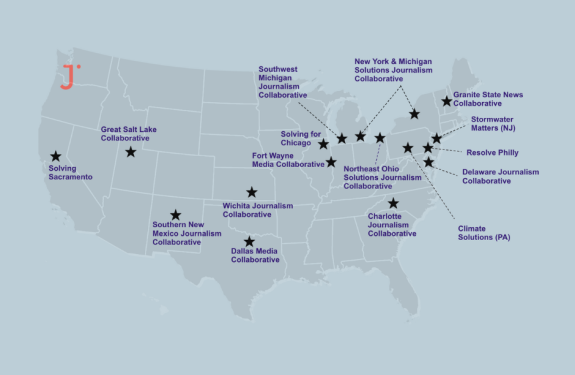
SJN’s five-year Local Media Project (LMP) concluded in 2023, having catalyzed 15 media collaboratives, 13 of which are now financially self-sustaining.
Together, these collaboratives resulted in more than 2,000 pieces published through the engagement of more than 190 news outlets (more than 50 of which serve and are led by members of underrepresented communities) and 65 civic and educational organizations. All brought a solutions lens to reporting on a pressing challenge in their communities, sparking more informed dialogue, increased community engagement and real-world impact.
The success of the LMP is a result of partners adopting innovation; breaking down walls of competition; embracing new technologies; building solid bridges of communication with underserved communities; developing fundraising capacity; creating and adapting strategic and sustainability plans; and forming trusting relationships that helped them overcome challenges, including the disruption caused by the Covid-19 pandemic.
In addition to the local collaboratives, one cross-state group emerged from the initiative: the New York & Michigan Solutions Journalism Collaborative, which has brought a data-driven focus to the challenges faced by caregivers in Western New York and Southeast Michigan and is having a significant impact on discussions about their support needs through funding, programs and policies.
Reporting Increased Coverage, Awareness and Funding
In 2023, the Great Salt Lake Collaborative, catalyzed by a grant from SJN, won the Excellence in Collaboration and Partnership Award from the Online News Association. The Collaborative launched a major solutions project exploring ways to save the Great Salt Lake and reported on how Las Vegas has reduced water consumption and how Israel moved from water scarcity to surplus. The judges’ comment: “This is an excellent example of what can happen when journalists, academics, community groups and others come together over a single, urgent issue and are relentless in their coverage and focus. Through a solutions lens, they are addressing an essential statewide problem in ways that wouldn’t have been possible without this collaboration.” Newsrooms produced and shared over 240 stories, with a focus on evidence-based solutions. Subsequent polls showed 80% of Utahns concerned about the lake, and the legislature allocated $1 billion to lake preservation.
Community Invited to Share Ideas
To connect and build trust with community members, the Wichita Journalism Collaborative partnered with a local library to offer weekly “office hours.” Maren Berblinger, a project manager for the collaborative, said the goal was to “provide inspiration and sourcing for solutions stories that we as journalists might be distant from.” In the first few weeks of the program, community members were dropping in to share story ideas and let collaborative representatives know what story topics would hold their interest.
University-Newsroom Initiatives
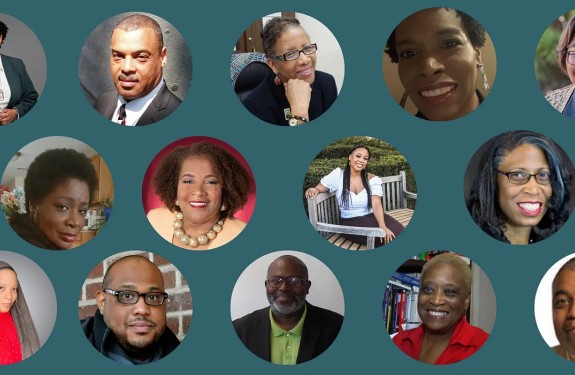
HBCU Educator / Black Press Academy
In July 2023, SJN launched its first-ever HBCU Educator /Black Press Academy, deepening our work with colleges and universities and building on SJN’s commitment to renew and refresh journalism for historically underserved communities. Educators from historically Black universities were paired with newsroom leaders from Black-led news outlets to host grant-funded community engagement events, collaborate on reporting projects and mentor student journalists. The kickoff, at the Birmingham Civil Rights Institute, featured QCity Metro Publisher Glenn Burkins and Alicia Bell, director of the Racial Equity in Journalism Fund at Borealis Philanthropy. Latasha Rouseau, executive director of Sapelo Square, a digital media and education collective serving Black Muslims, said the academy challenged her newsroom to take a new approach: “Joining the Solutions Journalism cohort thrust our newsroom into a type of reporting and information gathering that was direct and engaged.”
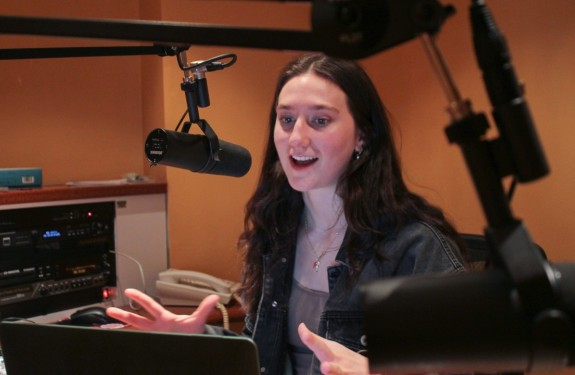
Student Media Challenge
SJN’s inaugural Student Media Challenge provided student journalists at eight universities a year of training and mentoring, as well as funding to pursue a solutions journalism reporting project. Among the highlights over the course of the 2022-23 academic year: Díg en Español, a LatinX news magazine at California State University, Long Beach, published its first bilingual edition with a range of solutions stories. At Queens University in Charlotte, North Carolina, students saw dozens of their stories published in the city’s professional media. Michigan State’s Knight Center for Environmental Journalism used its grant to fund “The Food Fix” podcast on food sustainability issues, from which an episode took top prize in a Planet Forward contest. Students there also produced stories for the Great Lakes Echo environmental news service and the Spartan Newsroom, which serves professional newsrooms across Michigan.
Over the course of the 2023-24 academic year, student journalists from eight U.S. colleges and universities fanned out across their campuses to report on possible solutions to the mental health crisis.
Pictured: Anna Lionas hosts "The Food Fix" podcast at Michigan State University. Photo courtesy of MSU Knight Center for Environmental Journalism

This is not soft reporting. As journalists, our primary concern should be the public, people we serve. If we know that the audience does not like persistent problems, then we should be hunting for solutions.
Touchpoints

Climate Peer Network
In 2023, in response to the needs of our growing community of climate solutions journalists, SJN launched the Climate Peer Network to enable journalists to share best practices and learn directly from one another, as well as from experts on topics of shared interest. Monthly conversations average 125 participants from around the world and include small group breakouts to develop relationships with like-minded peers covering climate issues. These convenings are creating a networked, supportive community for freelancers and staff reporters alike. As one participant said, “SJN plays a convener role that is fostering valuable interactions which would not be possible without their support.”
Pictured: Kayla Benjamin of The Washington Informer participates in the Climate Changes Everything conference in New York City in September 2023.
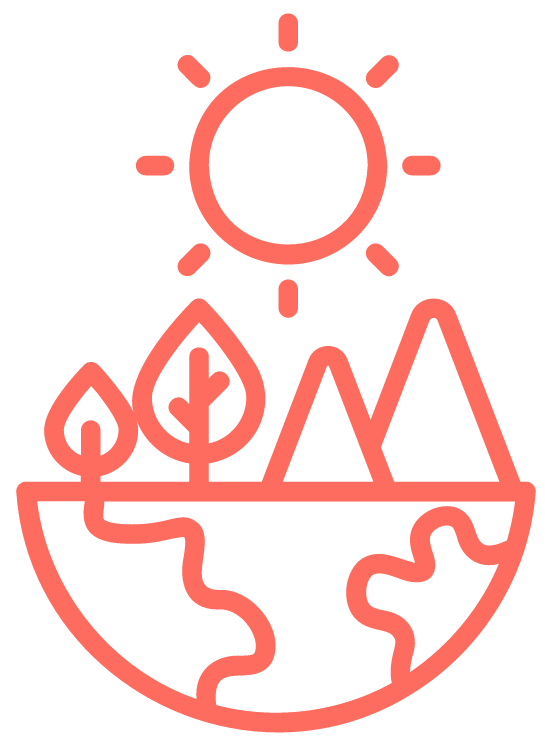
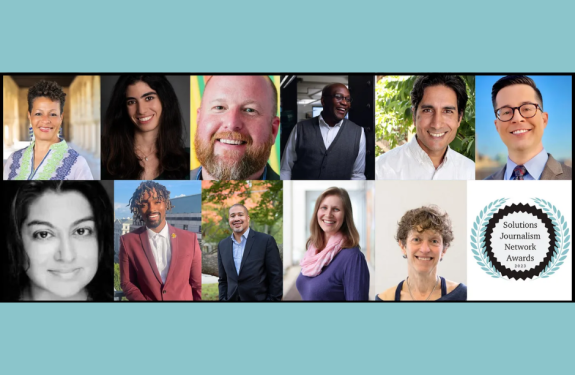
Community Advisory Council
To further its commitment to celebrating and disseminating excellent examples of solutions journalism, and to deepen its relationships with other organizations in the journalism support realm, SJN convened a six-month advisory council to design its first-ever awards program. Expertise on the 11-member council spanned journalism, education, equity and inclusion, systems change and community-building.
Advisory Council members included Aparna Mukherjhee, executive director of the Society of Environmental Journalists; Letrell Crittenden, director of inclusion and audience growth, American Press Institute; Sara Lomax, co-founder of URL Media; André Natta, executive director, Alabama Initiative for Independent Journalism; Amy Kovac-Ashley, executive director of Tiny News Collective; Rashad Mahmood, executive director, New Mexico Local News Fund; and Diana López, coordinator of programs, Online News Association.
The awards program design was finalized and launched in 2023, with winners to be announced in early 2024.
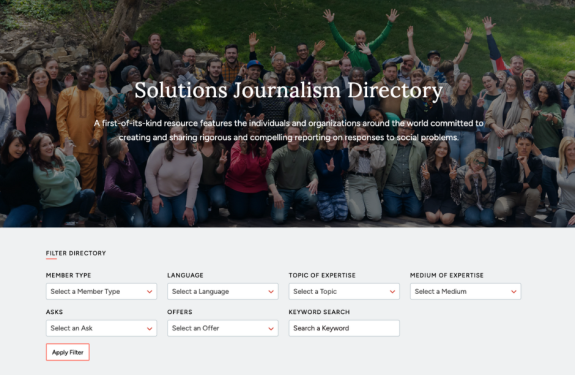
Network Directory
More than 400 individuals working in 46 countries (and in 36 languages) and 76 organizations based in 17 countries responded when we launched the Solutions Journalism Directory in 2023, a first-of-its-kind resource that features the individuals and organizations around the world committed to creating and sharing rigorous and compelling reporting on responses to social problems. This growing database will help journalists build connections, strengthen their networks and contribute to the momentum of transforming journalism and spreading the practice of solutions journalism around the world.
Reporter Earned Trust of Local Officials
As a journalist, Francine Andrew has covered responses to the spread of the Rift Valley Fever, one of the deadly arboviruses, in the Eastern Province of Rwanda. Her solutions-oriented approach to reporting for digital publication Fezaa has opened the door to credible and critical information and data that was previously inaccessible. Some officials in local institutions have started to “trust us with even the most sensitive information,” Andrew said, “because they now believe that the way it will be published cannot harm the society.”
[Solutions journalism] differentiates us from our competition and serves our communities.

Pictured above: Journalists from nine countries participate in the July 2023 Train-the-Trainers program supported by Kyuwon Lee, SJN's training & curriculum manager, and Katherine Noble, one of SJN’s climate managers.
